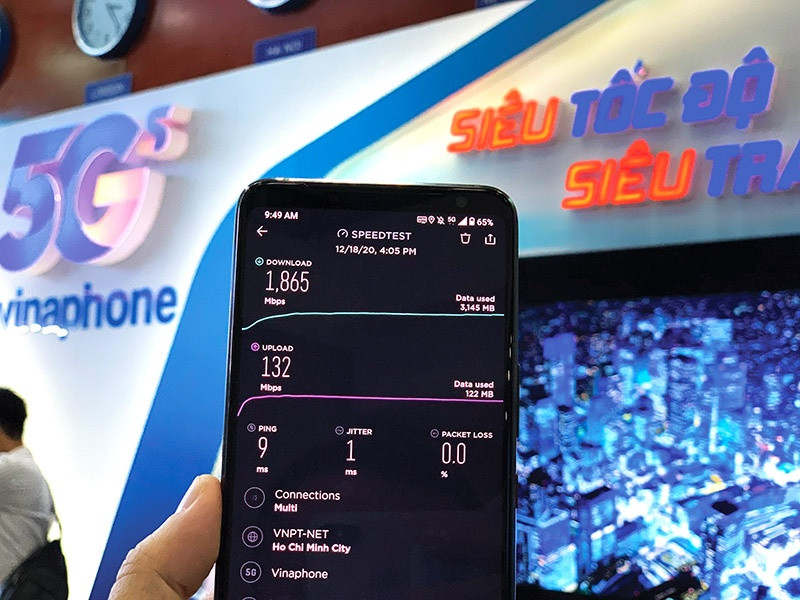 |
The Ministry of Information and Communications has announced the good performance of businesses in the ICT sector in the first quarter of 2022, with Viettel, FPT, and Vietnam Posts and Telecommunications Group, known as VNPT being prominent leaders on the digital transformation path.
In general, players operated stably with total sector revenues of VND9.9 trillion ($430.43 million), up 2 per cent on-year.
Vietnam Post fetched revenues of nearly VND9 trillion ($391.3 million), up 7.8 per cent on-year, while Viettel Post made revenues of VND5.71 trillion ($248.26 million), rising by 10.2 per cent on-year.
In the telecommunications industry, fixed and mobile broadband subscriptions saw an on-year rise. Meanwhile, the number of mobile subscriptions using mobile money services in the first three months slightly hiked. Viettel took the lead in the development of mobile money subscribers.
During the three-month span, Vietnam’s smartphone users out of the total number of mobile subscribers reached 88 per cent. The number of households with optical fibre was 69.43 per cent by March, slightly up from 68.31 per cent in January, and up 15 per cent on-year.
Telecoms players made big gains in the three months. For instance, FPT Telecom reported revenue growth of 20 per cent in January and February, while its pre-tax profit rose 21 per cent on-year. VNPT witnessed consolidated profit ascend 3.04 per cent on-year, with digital services rising significantly by 25 per cent. Meanwhile, Viettel’s consolidated revenue and profit hiked 8.4 and 31.8 per cent on-year, respectively.
Revenues of Vietnamese ICT companies made up 17 per cent of the industry’s total.
Ministries, agencies, and cities and provinces continue to boost e-public services, with those reaching level 4 hitting 97 per cent by the end of March.
Digital transformation is also accelerating. Nearly 50 cities and provinces have issued resolutions about digital transformation, while 54 out of 63 cities and provinces have built IT application plans for the 2021-2025 period.
Thus far, the MIC has crafted and issued specific 5G standards on mobile communication base station equipment, terminal equipment, and internet access services on 5G terrestrial mobile networks, among others.
Last month, many more legal amendments were made to support players. The government on April 12 issued Decree No.25/2022/ND-CP amending and supplementing some regulations that guide the implementation of the Law on Post, which will take effect from June. And more are coming, including the discussion of the amended Law on Telecommunications and the amended Law on Radio Frequencies in the upcoming May session of the National Assembly.
The ministry is working on regulations over bandwidth auctions and preparation of international mobile telecommunications band auctions, while increasing mobile subscriptions in villages and hamlets.
Research and development as well as production of 5G devices will be promoted from small production to large-scale, and content will be completed on the draft Law on Digital Technology Industry and the Strategy on Digital Technology Development by 2025, as well as development of related databases.
To prepare for future growth, Viettel in mid-April announced it would build the largest data centre in Vietnam, located in Hoc Mon and Cu Chi districts of Ho Chi Minh City. The telecom giant will work with the two districts to promote digital infrastructure, government, economy, and society.
In Vietnam, cloud computing and fintech businesses are growing thanks to e-government initiatives and the promotion of e-money, powering the demand for data centres. NTT Global Data Centres Corporation and Quang Dung Technology Distribution JSC have, as a result, entered into a collaboration for setting up and running data centres in Ho Chi Minh City.
MobiFone, meanwhile, is building a roadmap for implementation and commercialisation when 5G is licensed by the MIC. It has also been studying the solutions for smart agriculture, e-meetings, e-learning, industry automation, and more based on 5G technology.
Vietnam’s digital economy has seen significant growth over the last decade and is expected to be valued at $57 billion by 2025. In Q1/2022, the country’s revenue from digital economy reached $53 billion.
Source: VIR